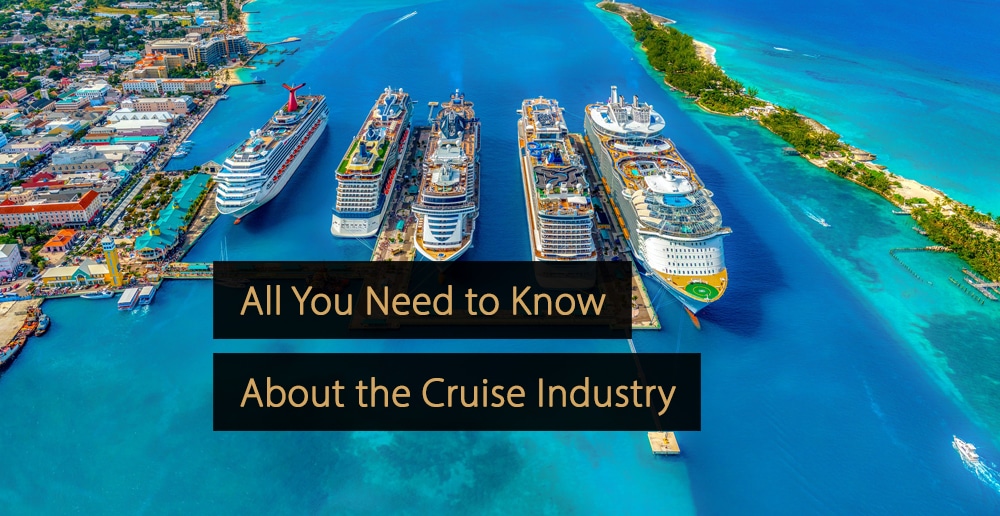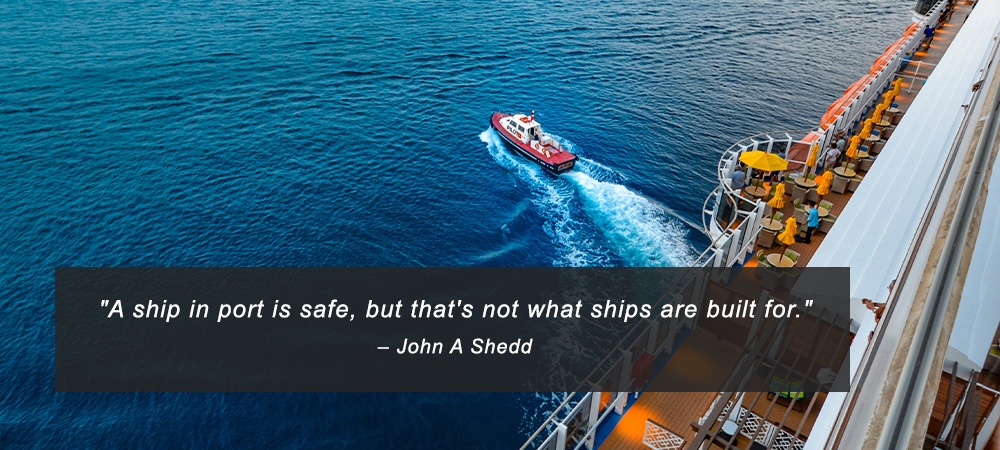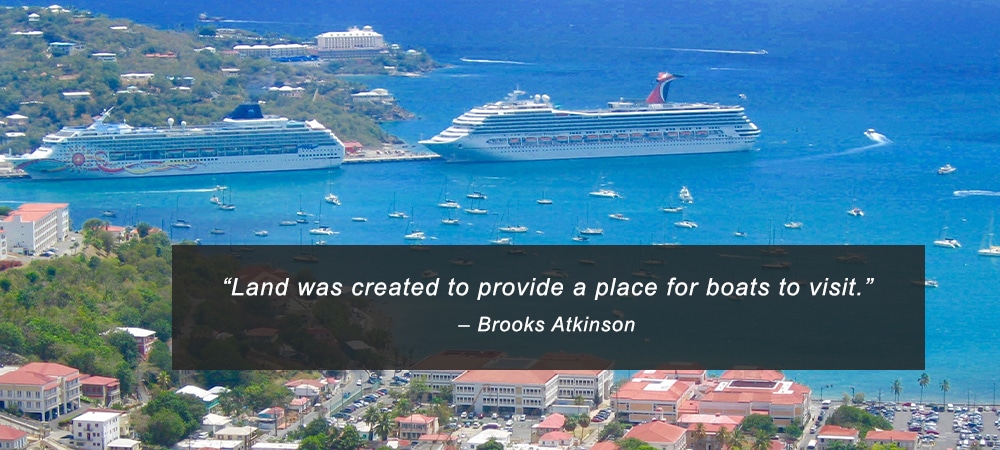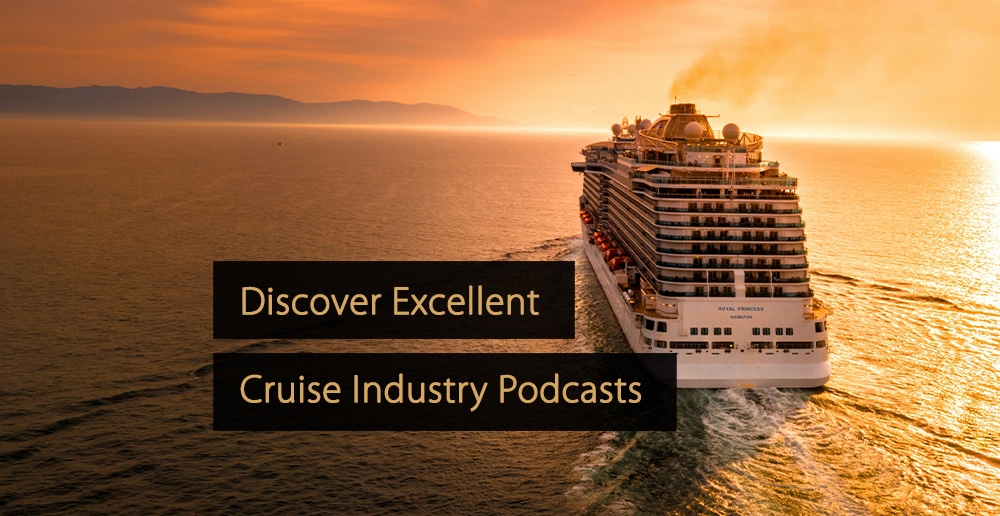The cruise industry provides unique experiences for customers, blending elements of transportation, hospitality, and entertainment. However, within the cruise industry, there are a variety of cruise line classifications and a number of different cruise types. In this article, you will be able to find out everything you need to know about cruises.
Table of Contents:
- What is the Cruise Industry?
- What is a Cruise Line?
- 6 Biggest Companies Within the Cruise Industry
- Cruise Line Classification Within the Cruise Industry
- Types of Passengers in the Cruise Industry
- Examples of Types of Cruises Within the Cruise Industry
- 10 Popular Websites to Book Cruises
- Revenue Management Within the Cruise Industry
- Travel Marketing Tips to Gain More Customers
- Attract More Bookings By Connecting to a Travel Agency
- List of Websites for Finding Work in the Cruise Industry
- Cruise Careers: Tips to Get Started in the Cruise Industry
- A List of the Main Cruise Industry Jobs
- Cruise Industry: Apply for Cruise Jobs With These Companies
- The Latest Technology Trends Within Travel
- The Latest Travel Trends
- The Importance of Travel Software
- Google Travel Insights: Data and Tools for the Cruise Industry
- Related Industries
What Is the Cruise Industry?
The cruise industry refers to all businesses that are involved with facilitating pleasure voyages via the use of cruise ships. This would include cruise operators and cruise lines, as well as businesses that are involved with the manufacture of cruise ships. In addition, it includes certain entertainment companies specializing in cruise entertainment.
The cruise industry also shares similarities with the hotel industry, as accommodation is provided on board. This means the people hired to work in the cruise industry are diverse, including cruise ship crew members, service staff, entertainers, and even specialist cruise ship hotel managers.
What Is a Cruise Line?
‘Cruise line’ is the name given to a company that operates cruise ships and sells cruises to paying customers. Within the price of a cruise, customers can typically expect a cabin on the cruise ship, some form of entertainment, access to food (sometimes on an all-inclusive basis), and for the ship to travel on a set route.
With this in mind, global cruise lines operate in a unique space where they are part of the travel industry, entertainment industry, and leisure industry while also implementing elements of hotel management.
It is important to understand that cruise ships and cruise lines are considered separate from passenger ships and passenger lines. The key distinction between the two is that cruise lines offer round trips, with the core focus being pleasure, whereas passenger lines primarily focus on travel from one location to another.
6 Biggest Companies Within the Cruise Industry
The cruise line industry is home to a number of large and established businesses, with the following six companies ranking among the biggest and best-known in the world today:
Carnival Corporation & PLC is one of the biggest cruise companies in the cruise industry. Carnival Corporation & PLC was founded in 1972 and comprised Carnival Corporation, based in the United States, and Carnival PLC, based in the United Kingdom. Its brands include Carnival Cruise Line, Princess Cruises, Holland America Line, Seabourn Cruise Line, Cunard, AIDA Cruises, Costa Cruises, and P&O Cruises.
Widely recognized as the largest cruise company in the world, Carnival Corporation & PLC has a combined fleet size of more than 100 cruise ships. The Carnival Cruise Line brand carries around 5 million passengers each year. In total, it is estimated that all of the Carnival Corporation & PLC brands cater to around 12 million annual cruise guests.
Click here for more information about Carnival Corporation & PLC.
Another large cruise company within the cruise industry is Royal Caribbean International. Founded in 1968, Royal Caribbean International is often cited as the second-largest cruise line in the world, catering to around 5 million passengers each year. Its parent company, Royal Caribbean Cruises, also owns the Celebrity Cruises and Azamara Club Cruises brands, attracting an additional one million annual passengers.
The main Royal Caribbean International cruise line operates with a fleet of 26 vessels, and this includes the four largest passenger ships of any kind in the world, including the ‘Symphony of the Seas’ ship, which is recognized as the world’s largest passenger ship, when measured by gross tonnage.
Click here for more information about Royal Caribbean International.
MSC Cruises is a wider Mediterranean Shipping Company sub-division and functions as a cruise line. The company was founded in 1989, has its headquarters in Geneva, Switzerland, and is one of the largest employers in the entire cruise ship industry, providing jobs for in excess of 23,000 people in total.
The cruise line operates with a fleet of 17 vessels, with plans to increase this to 25 ships over the next decade. It is estimated that around 3 million passengers board MSC cruise ships each year, and the company provides services to more than 200 destinations spread across five different continents.
Click here for more information about MSC Cruises.
Founded in 1996, with its headquarters in Celebration, Florida, the Disney Cruise Line is owned by the Walt Disney Company. The cruise line accounts for more than two percent of the global cruise market, both in terms of revenue and passengers served, and the company operates a terminal at Port Canaveral in Florida.
In total, the Disney Cruise Line possesses a fleet of four ships. Disney Magic is the oldest ship, having entered service in 1998, while Disney Dream and Disney Fantasy, introduced in 2011 and 2012, respectively, are the joint largest. The cruise line also owns Castaway Cay, a private island in the Bahamas, which serves as a port for the ships.
Click here for more information about Disney Cruise Line.
Norwegian Cruise Line was founded in 1966 and is based in Miami, Florida. It is recognized as the third-largest cruise line in the world, as measured by total passengers, accounting for more than eight percent of the global cruise market. Norwegian operates with a fleet of 17 vessels, bringing in more than $5 billion in annual revenue.
The company provides cruises to more than 400 destinations all around the world. It also owns two private Caribbean islands: Great Stirrup Cay and Harvest Caye. In total, it is estimated that the cruise line employs more than 30,000 people, which makes it the third-largest employer in the cruise industry.
Click here for more information about Norwegian Cruise Line.
Founded in 1993, Genting Hong Kong is a cruise line owned by Genting Group. It includes the brands Dream Cruises and Star Cruises, both based in Hong Kong, and Crystal Cruises, which is based in Los Angeles, California. All in all, this provides the company with a fleet of more than 15 vessels.
Combined, these various Genting Hong Kong brands are estimated to account for two percent of annual cruise passengers, while the company brings in around five percent of the industry’s annual revenue. The company attracts more than 500,000 passengers each year, with Dream Cruises attracting around 260,000 of these.
Cruise Line Classification Within the Cruise Industry
While different cruise lines operate with different business models, they can generally be categorized according to the four main classifications, which are as follows:
1. All-Inclusive Cruises
All-inclusive cruises tend to be regarded as the top-of-the-range option, offering high-quality services, which are fully included with the price of the cruise package. These services will typically include food and drinks, along with flights and/or transfers, internet access, and quality entertainment. Examples of all-inclusive cruise lines include Seabourn Cruise Line and Celebrity Cruises. Ships will typically hold between 100 and 800 passengers.
2. Luxury Cruises
Luxury cruises tend to offer high-quality services, similar to what you might expect from an all-inclusive cruise, although some of those services will not all be included with the price of the cruise itself. Within this category, the cruise ships used are generally modern, and customers are attracted to the promise of comfortable cabins and excellent facilities. Examples of luxury cruise lines include Dream Cruises and Crystal Cruises.
3. Budget Cruises
Budget cruises are often ideal for families or people looking to go on a cruise for the first time. They represent a more affordable option than all-inclusive or luxury cruises and tend to be shorter in duration while being more focused on specific parts of the world. The ships may cater for upwards of 1,000 passengers and will usually be slightly older. Examples of budget cruise lines include P&O Cruises and Disney Cruise Line.
4. Low Budget Cruises
The most affordable of all the cruise classifications, low-budget options are designed to appeal to customers primarily on the basis of pricing. In order to reduce costs and optimize revenue, cruise liners adopting a low-budget model will tend to provide fewer services, and the quality of those services may not be as high. Generally, the cruise ship will be large, catering to up to 3,000 passengers, while cruises last less than ten days.
Types of Passengers in the Cruise Industry
The following table delineates the diverse demographics and preferences of cruise passengers, highlighting. Understanding these passenger types and their preferences is crucial for cruise lines to tailor onboard offerings and enhance the overall guest experience.
Examples of Types of Cruises Within the Cruise Industry
There are a variety of different types of experiences on offer from companies in the cruise industry. Below, you will find a breakdown of some of the most common types and what you can expect from them:
1. Ocean Cruises
Ocean cruises will typically travel between different islands using large cruise ships, which are usually capable of carrying thousands of passengers at once. As a result, they are ideal for people seeking busy cruises with plenty of people to talk to. These cruises may be aimed at different demographics but will have hotel-like facilities, often including pools and shops. Entertainment options on an ocean cruise are also likely to be extensive.
2. River Cruises
As the name suggests, river cruises travel along rivers rather than across oceans, meaning they usually remain in one country or at least one region. The cruise ships are significantly smaller than the largest ocean cruise liners, and, as a result, some of the facilities and entertainment options may also be scaled down. They are often all-inclusive, can be more relaxing – due to traveling on stiller waters – and are sometimes seen as less ‘hectic.’
3. Food & Wine Cruises
Cruises that are focused on food and wine will place far less emphasis on entertainment options and facilities, instead prioritizing high-quality cuisine and an excellent wine selection. For this reason, they are ideal for cultured travelers looking to relax and unwind. In addition, they can often serve as an educational experience, providing cookery classes, wine-tasting sessions, and lessons on the best wines to pair with certain foods.
4. Family Cruises
Intended to provide something for the whole family, these cruises will often be busy and provide various entertainment options throughout each day, catering to different age groups. They may offer facilities like creches or children’s clubs and may or may not be all-inclusive. Different family cruises may be aimed at slightly different age ranges, and it can be important to check this, as some will also have a minimum age limit.
5. Romantic Cruises
Aimed at couples or singles looking to find love, romantic cruises tend to be much less busy than family or ocean cruises, giving couples time and space to enjoy each other’s company. Entertainment and dining options are tailored to create a romantic atmosphere aboard the ship, and most of these cruises are adult-only, avoiding the need to provide facilities for children. Some companies also specialize in offering cruise ship weddings and honeymoons.
6. Luxury Cruises
Luxury cruises are designed for those willing to spend more money for the best possible experience. They take place on smaller boats and are more exclusive, meaning they are less busy than family options. Cabins will usually be larger, the facilities on the boat will typically be higher in quality, and service will be more personalized, sometimes including personal butlers. In many cases, they will be all-inclusive.
7. Adventure Cruises
Adventure cruises can be the ideal choice for people who are more interested in natural beauty and exploration. They usually have far fewer on-boat entertainment options, instead prioritizing travel to interesting locations during the voyage. These destinations range from remote and picturesque islands to much busier locations, where those on board can participate in outdoor activities, like scuba diving or jet skiing.
10 Popular Websites to Book Cruises
Customers have a wide range of options to choose from when it comes to actually booking cruises, but the ten websites below represent some of the most popular online options:
1. Cruise Line Websites
The first option available to customers or travel management companies looking to book a cruise is to do so directly via a cruise line’s website. Generally speaking, this would be the preferred option for most cruise industry companies because direct bookings are not subject to requirements to pay a commission fee to a third party, such as a travel agent. As a result, the cruise line is able to make more revenue per booking this way.
Expedia is based in Seattle, Washington, and functions as an online travel agency and a metasearch engine. Cruise lines can list availability by connecting with the platform directly or by connecting to global distribution systems, such as Amadeus and Sabre. Users are then able to search for cruises based on their preferred date and destination, and additional telephone support from travel agents who specialize in the cruise industry is also available.
Click here for more information about Expedia.
Cruisewatch is a service based out of Hannover, Germany, specializing in selling cruise packages. The platform includes options to find cruises based on your preferred departure date, destination, or cruise line, while there are also options for late deals and the most popular cruises. Furthermore, the service includes a comprehensive price alert feature, making it easier for customers to book at the best possible moment.
Click here for more information about Cruisewatch.
Costco Travel is an online travel platform launched in 2000 as a subsidiary of the Costco Wholesale Corporation. The service is exclusively available to Costco members living in the United States or Canada, and the company’s headquarters is in Issaquah, Washington. Although its membership restrictions mean it is less widely available than some alternatives, it offers excellent cruise industry prices, as well as rewards for booking through the platform.
Click here for more information about Costco Travel.
The Priceline.com service is owned by Booking Holdings, which also owns Booking.com and Kayak.com. It is an online travel agent that uses global distribution systems like Sabre and Travelport to check cruise ticket availability in real time. Its search options are extensive, and it includes the option to find late deals. While the service is based in Norwalk, Connecticut, in the United States, it has seen significant growth in the European and Asia-Pacific markets.
Click here for more information about Priceline.com.
When the TripAdvisor platform first launched in 2000, it was a dedicated platform for users to leave reviews on travel products and services. While reviews still play a key role in how it operates, it also acts as a hotel metasearch platform, allowing users to find and book travel products, including cruises. The cruises section of the website also allows users to find information, review specific cruise ships, and compare ticket prices.
Click here for more information about Tripadvisor.
Founded in 1995, Cruise Critic is owned by TripAdvisor and functions in a similar way, serving not only as a metasearch engine but also as a cruise review platform. The website provides users with options to search for cruises based on destinations and ships, searching more than 70,000 itineraries in total. However, results can be similar to TripAdvisor’s dedicated cruise platform that provides more detailed information on cruise ships and customer experiences.
Click here for more information about Cruisecritic.
Avoya Travel is based in Fort Lauderdale, Florida, and is an online travel agency. While many OTAs have moved towards fully automated, self-service systems, Avoya Travel combines the ease of modern search engine technology with a more personalized touch. Users are able to access expert support from an ‘Independent Vacation Planner,’ who understands the cruise industry and its nuances and will be able to offer exclusive savings.
Click here for more information about Avoya Travel.
The CruiseDirect service was set up in 2001 and is specifically focused on the cruise industry rather than the wider travel industry. It offers excellent search options and support via online chat and telephone. Aside from offering a price match guarantee, the platform also allows customers to book with a deposit, and payments will be automatically adjusted if the final price of the cruise drops after the booking is made.
Click here for more information about Cruisedirect.
Established in 2000, CheapCaribbean.com was initially focused on travel products within the Caribbean, including cruises, but it has since branched out to offer a global service. Therefore, cruises to various destinations can be found and booked through the platform. The search options are extensive, while telephone support is also available, and the company advises users that its cruise experts are also able to offer unpublished fares.
Click here for more information about CheapCaribbean.
Revenue Management Within the Cruise Industry
The concept of revenue management focuses on analyzing customer behavior with a view to optimizing the availability and pricing of products to optimize financial results. Within the cruise industry, this means selling the right cruise product to the right customer at the right moment for the right price using the right channel.
Achieving this requires the ability to forecast demand accurately and understand how customers actually view your offering. Our article, ‘Revenue Management; Clearly Explained!’ will give you a rounded knowledge of what revenue management is, how it works, the necessary conditions, and its overall importance.
Travel Marketing Tips to Gain More Customers
Marketing plays a critical role in the success of almost all travel companies, and those operating in the cruise industry are no different. After all, it is through advertising and other marketing efforts that brands are able to convey their values, stand out from rivals, and provide reasons why customers should choose them.
Through the article ‘Travel Marketing: The Latest Marketing Tips to Boost Your Results!’, you will gain insights into some of the latest and most effective marketing strategies and how they can improve business outcomes.
Attract More Bookings By Connecting to a Travel Agency
Travel companies can live or die based on the number of bookings they attract. For this reason, maximizing demand is a top priority for the cruise industry, and travel agencies can help enormously. Customers may turn to a travel agency for a number of reasons, but convenience and the ability to easily compare prices are usually high on the list.
In the article “Attract More Bookings By Connecting to a Travel Agency”, you will be able to find more information on the benefits of connecting to a travel agency and find a list of some of the most popular platforms.
List of Websites for Finding Work in the Cruise Industry
There are plenty of jobs to go around within the cruise industry, but finding cruise ship jobs depends on looking in the right places. In particular, online job boards, cruise line websites, social media platforms like LinkedIn, and recruitment agencies with a track record in the industry can all help you out.
Take a look at the “Cruise Ship Jobs: List of Websites to Find the Best Job Vacancies!” article for more information on finding work and for a list of the best online platforms to explore during the job search process.
Cruise Careers: Tips to Get Started in the Cruise Industry
The cruise industry offers a variety of cruise careers, with options for almost anyone. However, actually getting started requires you to optimize your CV, obtain the right level of education for the role you are interested in, practice your interview technique, and make the most of concepts like personal branding and professional networking.
Check out the “Cruise Careers: Tips to Start Your Career at a Cruise Ship” article, where you will have access to nine tips that are designed to help you get started and successfully land your first cruise industry job.
A List of the Main Cruise Industry Jobs
The cruise industry is a large sector within the wider travel and tourism sector, offering excellent variety in terms of the jobs available. These cruise industry jobs range from positions that are suitable for recent school leavers right the way up to positions that require extensive work experience and/or academic qualifications.
Check out the “Cruise Industry Jobs: An Overview of All Cruise Ship Positions”, where you can access a position-by-position breakdown of the available roles, complete with insights into what each of these jobs really involves.
Cruise Industry: Apply for Cruise Jobs With These Companies
One of the best ways to apply for cruise jobs is to take the direct approach by applying through cruise line websites. With that being said, in order to do this effectively, you will need to build up an understanding of the cruise industry and learn about some of the biggest employers operating within the sector.
Read “Cruise Jobs: Apply Directly For a Job at the Best Cruise Lines” for a list of nine of the best companies to turn to, complete with information that will allow you to identify the cruise lines you would most like to work for.
The Latest Technology Trends Within Travel
As with many other sectors, modern technology has hugely disrupted the cruise industry. This includes more widespread use of smart devices powered by the Internet of Things and increased reliance on artificial intelligence, machine learning, and software packages designed to assist with automation.
By reading our ‘Key Technology Trends Emerging in the Travel Industry’ article, you can build your knowledge of some of the main technology trends and how they can benefit cruise lines and other travel companies.
The Latest Travel Trends
For those in the cruise industry, as with the broader travel industry, it is important to keep up with the latest trends. As new ideas, new technology, and new ways of doing business emerge, customer behaviors may change, and the companies that best understand and adapt to these changes are the ones most likely to thrive.
In the article ‘Travel Trends: Opportunities for the Travel Industry’, you will learn more about the key trends disrupting the industry and how travel and cruise industry businesses can capitalise on them.
The Importance of Travel Software
Like other areas of travel and tourism, companies operating within the cruise industry increasingly rely on software. In particular, revenue management and reputation management applications have proved useful, while software packages can also assist with tasks like marketing and distribution of cruise tickets.
You can visit the Revfine.com ‘Travel Technology & Software’ category page to find various articles explaining more about the importance of software within the cruise industry and the wider travel industry.
Google Travel Insights: Data and Tools for the Cruise Industry
Cruise industry leaders often have to make important decisions based on wider market trends. Google Travel Insights represents one of the easiest and best ways to keep up with these trends, providing access to user search data, travel insights, and various other tools that can all be used strategically and effectively.
Read the “Google Travel Insights: Tools & Data Trends for The Travel Industry” article to find out more about the Google Travel Insights platform, its three main components, and the numerous ways the service can help the cruise industry.
Cruise Industry FAQs
The cruise industry is diverse, encompassing global cruise lines and companies involved in designing and manufacturing cruise vessels. A broad range of cruise types offer different experiences, and most cruise lines offer direct bookings while selling packages via third-party platforms.
Want to Learn More About Related Industries?
The travel industry exists out of many other industries, like the hotel, hospitality, and cruise industry. All these industries have in common that they are large service industries worldwide and increasingly important in the modern age. In the following articles, you will learn more about related industries.
- Hotel Industry; An Overview of All Different Types of Accommodations
- Hospitality Industry; Everything You Need to Know About Hospitality
- Tourism Industry; Everything You Need to Know About Tourism
- Restaurant Industry: Overview, Types, Examples and More
- What is the Difference Between the Travel and Tourism Industry?
- Travel Industry; An Overview of One of the Largest Service Industries
- Airline Industry: All You Need to Know About The Airline Sector
- Aviation Industry: Everything You Need to Know About the Aviation Sector
- Space Tourism: Space Companies That Will Make You An Astronaut
More Tips to Grow Your Business
Revfine.com is the leading knowledge platform for the hospitality and travel industry. Professionals use our insights, strategies, and actionable tips to get inspired, optimize revenue, innovate processes, and improve customer experience.Explore expert advice on management, marketing, revenue management, operations, software, and technology in our dedicated Hotel, Hospitality, and Travel & Tourism categories.
This article is written by:
Hi, I am Martijn Barten, founder of Revfine.com. With 20 years of experience in the hospitality industry, I specialize in optimizing revenue by combining revenue management with marketing strategies. I have successfully developed, implemented, and managed revenue management and marketing strategies for individual properties and multi-property portfolios.





















Leave A Comment